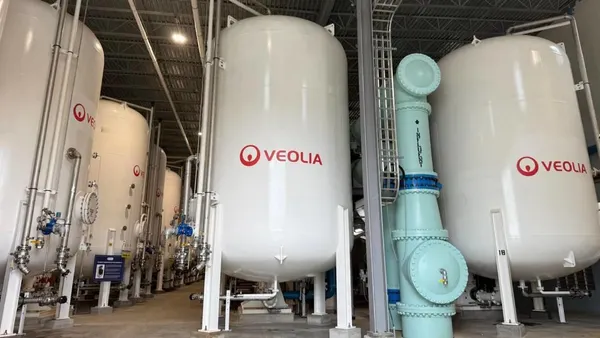UPDATE, July 27: St. Paul city staff will continue negotiations with waste haulers on creating organized residential collections after a city council vote on July 26, according to the Star Tribune. Officials said they wanted a plan in place by "summer or fall 2018." Opponents of the proposed organized collection system continue to argue against a myriad of factors, including perceived government overreach or losing the ability to only have on-call service for waste collections. Supporters continue to cite environmental benefits — and the potential perk of having fewer noisy trucks on residential streets.
The argument for much of St. Paul, including some on the city council, comes down to cost. City Council Member Chris Tolbert called price stratification, resulting from people getting different rates based on their negotiating skills or their address, "just wrong," according to the Tribune. Now, city staff say they want to work to lower prices for residents, keep small hauling companies in business and try to "trim" a $52 yearly fee that the city would charge residents for administration and implementation of an organized collection plan.
UPDATE, July 20: The St. Paul City Council has delayed its vote on a proposal for organized residential collections after a public hearing drew 23 speakers in opposition of the proposal and 18 in support, according to the Twin Cities Pioneer Press. Opponents said the proposal would end up costing the typical homeowner more than current trash bills, and argued that the proposal doesn't include shared-service options. Proponents supported the environmental and aesthetic reasons behind the proposal, noting that a new trash system could cut down on illegal dumping.
The vote is now slated to take place on July 26.
UPDATE, July 12: The city of St. Paul, MN has reached an agreement with 15 trash haulers to shift to organized collections in an effort to reduce traffic, noise pollution and air pollution, according to the StarTribune and other local outlets. This agreement follows nearly 11 months of negotiations between the city and its haulers.
The city council will meet for a public hearing on July 19 and a formal contract is likely to be presented in August. If all goes smoothly, the new collection system could be rolled out in mid-2018, which would affect more than 78,000 households according to the Tribune. It is likely that most of the households would have a different hauler serving them under the new system.
While this proposed agreement can be seen as a step forward for the city and its haulers, opposition group First Choice St. Paul has highlighted unresolved issues under the pending agreement, which could potentially be brought forward in next week's public hearing.
Dive Brief:
- The St. Paul, MN City Council has voted unanimously to organize a committee of city officials to assess next steps for establishing an organized collection system after negotiations with local haulers appear to have stalled, as reported by the Pioneer Press. The city's residential collections are currently handled through an open market system.
- Since August 2016, the city's 15 licensed haulers have attended nearly a dozen meetings with city officials and submitted three proposals for how an organized collection system could work. While the haulers are open to limiting collections to one company per block, they have yet to reach consensus on other areas such as pricing, the establishment of a legal entity to represent all 15 of them and the acceptance of a labor peace agreement.
- Haulers are open to abiding by the city's living wage ordinance, but the idea of organizing has been more complicated. Some haulers have said that their workers aren't interested in unionizing and are resistant to allowing labor organizers to contact them, as reported by MPR News.
Dive Insight:
Like other cities that have explored or pursued an organized collection system, St. Paul hopes to increase diversion rates and expand opportunities to collect other categories such as organics or appliances. After releasing the results of a resident survey showing interest in a new system last summer, the city began working with haulers to discuss details. While similar systems can be found elsewhere in Minnesota the possibility of doing this in the state's second-largest city has raised many questions.
The process of establishing a larger organized collection system in Los Angeles took more than six years and New York is on a similar path that is projected to take at least that long. The role of labor unions in New York's commercial waste industry has been the subject of much debate, and workers at the Sims Municipal Recycling facility recently voted to unionize, but so far no details have been finalized on how this might play into a new collection system.
The fact that haulers have an opportunity to help organize the collection system in St. Paul puts them in a unique position, but the city's decision to begin exploring other options also shows that their window of opportunity may eventually close. City officials haven't ruled out taking control of the system and putting out a request for proposals to bid on collection rights to certain districts. Now, the haulers must decide whether they're willing to make the requested concessions for the opportunity to remain more involved in the process or take their chances with bidding on contracts on the city's terms.









